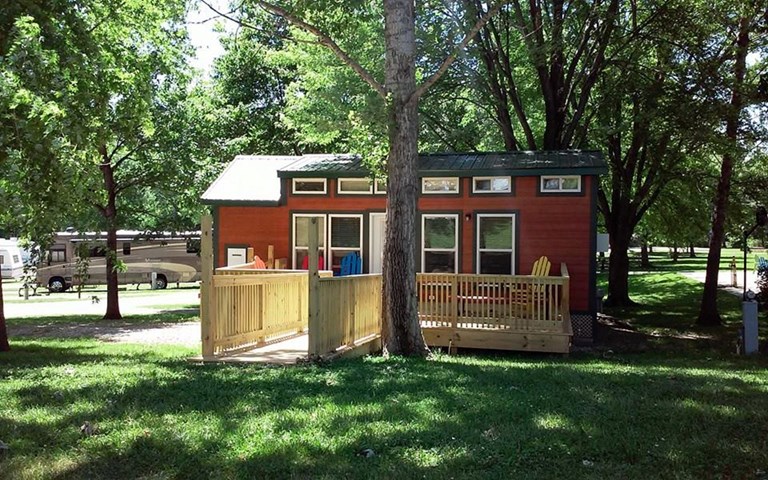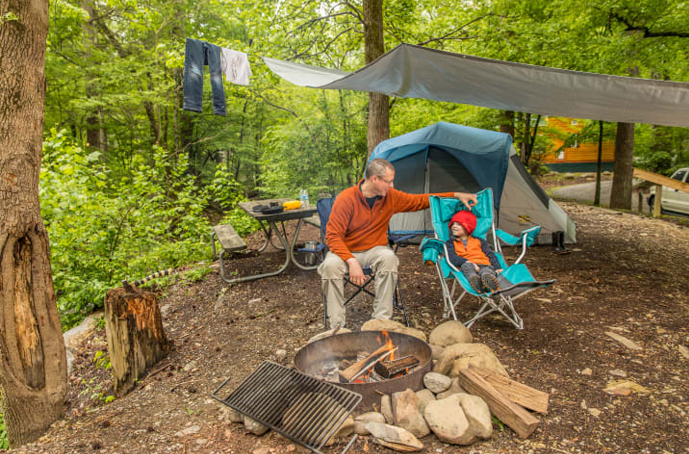Your cart is empty!
Make checkout easy by booking all your reservations at once. Add your sites from different campgrounds into your shopping cart* and then choose checkout.


Reposted from the KOA blog:
Being neighborly around the campground and practicing good etiquette is something most experienced campers internalize after years of practice. A few run-ins with inconsiderate folks breaking outdoor norms will quickly reinforce that you never want to be that person. But even longtime campers have to re-think some things once kids are involved.
For children, camping brings welcome freedom. Many of the rules from home are out the window, and that’s one of the fun parts of camping. Adults (usually) intuitively understand when they’re being too loud or bothering fellow campers. They can pick up on social cues and adjust their behavior. Kids are often gloriously ignorant of their surroundings, especially while on vacation.
For parents, this means teaching kids from an early age what is and isn’t acceptable behavior in a campground. While everyone understands that kids will be kids, parents can help by instilling good camping practices from the start. Of course, kids will “forget” from time to time, but that’s expected. Most kids take to camping quite quickly, and they understand that if they want to keep coming back, it means following the rules.
Here are nine tips to help kids learn good camping etiquette from the start.
Every excursion to the outdoors should follow the principles of Leave No Trace, which can be summed up as leaving the natural area as you found it. For kids, this is an excellent place to start, as it can lead to a good conversation about stewardship and responsibility. It can be helpful to talk in terms that young kids understand, such as an animal’s habitat. Camping is a way to spend time in the animal’s world, and you want to do everything you can to keep it in good shape while you’re here. You can work with older kids to learn more about the seven principles of Leave No Trace, which can also be applied more broadly to their lives outside the campground.
When you first arrive at the campground, everyone’s excited. You hate to be the buzzkill who starts with, “Here’s everything you can’t do.” Instead, spend a few minutes before arriving to talk about what kids can expect on the trip and how they are expected to act. Highlight that they’’re sharing this space with lots of other people, so they need to follow the rules to ensure everyone has fun.
Every campground has a set of rules to follow, and you should know what they are, including times for setting up, quiet hours, directions for pets, and where children can play. Pay particular attention to the roads in the camp. Children are quick to forget that there is traffic in the campground—treat the roads there as you would the streets at home. If they brought bikes, they should know when and where they can ride.
Most kids are tuckered out before quiet hours hit, but you should let them know that this is the bedtime for the campground. That means no more playing, music, or bright screens. Talk to your kids about being considerate to your neighbors. This goes for regular hours as well, as you should remind them to keep their voices relatively low, keep any music down, and avoid screaming. (Good luck with that.) At night, turn off the lights at your campsite and talk to your kids about how seeing the stars is one of the joys of camping. Bring along a constellation cheat sheet and see how many you can find together—until it’s time for bed.
It’s tough to get them to do this at home, and it’s tough to get them to do this at the campsite. But emphasize that this is your living area, and it’s important to keep everything clean. Toys, bikes, games, and equipment should be put away when not in use. Trash goes in a bag, which is delivered to the camp’s trash can. This is a good time for a lesson in responsibility. Assign chores to everyone to help keep the campsite running smoothly.
While this is obvious for adults, kids have a hard time with it. The shortest distance between two points is a straight line—why bother going around other people’s sites when it’s faster to go through? Once again, highlight that these are people’s living rooms for the weekend. You don’t go into other people’s living rooms without permission. It may be a tough battle to win, particularly with the little ones, but it’s worth getting them used to the idea.
Most busy campsites are filled with kids, each with their own bikes, sporting equipment, fishing rods, and outdoor games. Sharing with other kids is great if they want to share. What is communal property, like a game room or playground, and what’s someone else’s personal property can be confusing for kids. Start by talking about the area where they are allowed to play and things they are welcome to do. If they have any questions, it’s better to ask you than assume. This is another reason they should keep their area tidy, so they don’t lose track of their own things.
It’s always a good idea to introduce yourself to your camping neighbors at the start of your trip. Be friendly, and show that you’re approachable in case there are any problems. “Hey, if our kids are too loud, just let me know.” You might find out about other kids around the campground, and at the very least start the weekend with some goodwill.
It’s easy to make a list of things to tell the kids before starting a camping trip, but in reality, they usually take their cues from you. You should follow the rules, keep the noise down, and clean up after yourself. Be considerate of other campers and your kids will naturally follow your lead.
Camping can be a lot for younger kids who are used to a routine, so make allowances that they may not be as excited by a long hike as you are. Bring along plenty of games, Frisbees, coloring books, and other activities they enjoy doing. Sometimes a break in the day with a favorite book makes a huge difference.
That doesn't mean this area has to always be empty. When you start reviewing camping options, your history will display here to help compare sites and find the best stay. You will be able to share your stay information with friends or family and save it for a later time if you have a KOA Account.
Make checkout easy by booking all your reservations at once. Add your sites from different campgrounds into your shopping cart* and then choose checkout.